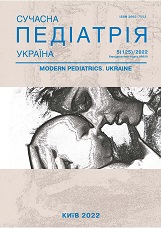A clinical case of combined immunodeficiency diagnosed by TREC assay
DOI:
https://doi.org/10.15574/SP.2022.125.123Keywords:
severe combined immunodeficiency, newborn screening, TREC, COVID-19Abstract
Early diagnosis and timely treatment of combined immunodeficiency (CID) is extremely important for the child’s future life. At birth, children often have no specific signs of the disease, but from the first months of life CID manifests by severe infections that can impact on the results of further treatment. Detection of T-cell lymphopenia by determining the number of T-cell receptor excision circles (TRECs) in a dry spot after the birth of a child formed the basis for newborn screening for severe CID. KREC (kappa-deleting recombination excision circle) assay is used for detection of B-cell lymphopenia.
Clinical case. We report the first case of CID (T-B+NK+) suspected by detection of TREC in Ukraine in a 2.5-month-old child. Immunodeficiency was manifested by severe complicated pneumonia at the age of 2 months, which had an atypical course and was resistant to treatment. A screening study to detect T- and B-lymphopenia using the TREC/KREC assay twice showed a zero TREC value and a KREC number of 3.12×105 per 106 cells, indicating severe CID. Subsequent immunological studies confirmed the deficiency of T-cell immunity. Venous thrombosis and increasing multiorgan failure led to the death of the child.
Thus, newborn screening using TREC assay will allow the timely detection of severe combined immunodeficiencies with further adequate therapy and measures to prevent life-threatening infections, including SARS-CoV-2.
The research was carried out in accordance with the principles of the Helsinki Declaration. The informed consent of the patient was obtained for conducting the studies.
No conflict of interests was declared by the authors.
References
Asakura H, Ogawa H. (2021). COVID-19-associated coagulopathy and disseminated intravascular coagulation. Int J Hematol. 113 (1): 45-57. https://doi.org/10.1007/s12185-020-03029-y; PMid:33161508 PMCid:PMC7648664
Boyarchuk O, Volyanska L, Kosovska T, Lewandowicz-Uszynska A, Kinash M. (2018). Awareness of primary immunodeficiency diseases among medical students. Georgian Med News. 12 (285): 124-130.
Boyarchuk O. (2018). Allergic manifestations of primary immunodeficiency diseases and its treatment approaches. Asian Journal of Pharmaceutical and Clinical Research. 11: 83-90. https://doi.org/10.22159/ajpcr.2018.v11i11.29059
Kinash M, Boyarchuk O, Shulhai O, Boyko Y, Hariyan T. (2020). Primary immunodeficiencies associated with DNA damage response: complexities of the diagnosis. Archives of the Balkan Medical Union. 55 (3): 11-18. https://doi.org/10.31688/ABMU.2020.55.3.19
King J, Hammarström L. (2018). Newborn screening for primary immunodeficiency diseases: history, current and future practice. J Clin Immunol. 38: 56-66. https://doi.org/10.1007/s10875-017-0455-x; PMid:29116556 PMCid:PMC5742602
López Castro J. (2020). COVID-19 and thrombosis: Beyond a casual association. Medicina clinica. 155 (1): 44. https://doi.org/10.1016/j.medcli.2020.04.014; PMCid:PMC7211593
Meyts I, Bucciol G, Quinti I et al. (2021). Coronavirus disease 2019 in patients with inborn errors of immunity: An international study. The Journal of Allergy and Clinical Immunology. 147 (2): 520-531.
Okhotnikova OM, Ivanova TP, Oshlyanskaya OA, Ponochevnaya OV et al. (2020). Treatment protocol of coronavirus infection (COVID-19) in children with chronic somatic diseases. Modern Pediatrics. Ukraine. 4(108): 18-32. https://doi.org/10.15574/SP.2020.108.18
Puck JM. (2019). Newborn screening for severe combined immunodeficiency and T-cell lymphopenia. Immunol Rev. 287 (1): 241-252. https://doi.org/10.1111/imr.12729; PMid:30565242 PMCid:PMC6324582
Shields AM, Burns SO, Savic S et al. (2021). COVID-19 in patients with primary and secondary immunodeficiency: The United Kingdom experience. The Journal of allergy and clinical immunology. 147 (3): 870-875. https://doi.org/10.1016/j.jaci.2020.12.620; PMid:33338534 PMCid:PMC7737531
Tangye SG, Al-Herz W, Bousfiha A et al. (2019). Human Inborn Errors of Immunity: 2019 Update on the Classification from the International U235nion of Immunological Societies Expert Committee. J of Clin Immunol. 40 (1): 24-64. https://doi.org/10.1007/s10875-019-00737-x; PMid:31953710 PMCid:PMC7082301
Downloads
Published
Issue
Section
License
Copyright (c) 2022 Modern pediatrics. Ukraine

This work is licensed under a Creative Commons Attribution-NonCommercial 4.0 International License.
The policy of the Journal “MODERN PEDIATRICS. UKRAINE” is compatible with the vast majority of funders' of open access and self-archiving policies. The journal provides immediate open access route being convinced that everyone – not only scientists - can benefit from research results, and publishes articles exclusively under open access distribution, with a Creative Commons Attribution-Noncommercial 4.0 international license (СС BY-NC).
Authors transfer the copyright to the Journal “MODERN PEDIATRICS. UKRAINE” when the manuscript is accepted for publication. Authors declare that this manuscript has not been published nor is under simultaneous consideration for publication elsewhere. After publication, the articles become freely available on-line to the public.
Readers have the right to use, distribute, and reproduce articles in any medium, provided the articles and the journal are properly cited.
The use of published materials for commercial purposes is strongly prohibited.

